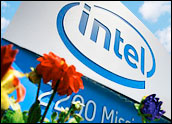
Microsoft is facing a new wave of resistance against its Vista operating system, thanks to reports that one of its most well-known partners hasn’t made the upgrade. An anonymous source — described as having direct knowledge of the situation — told The New York Times Intel found no compelling case to switch its own employees’ computers over to Vista. The decision followed an in-depth analysis of costs and benefits by Intel engineers, according to the Times’ source.
The news comes amid a general slow acceptance of the operating system among corporate and personal PC users. Vista requires significant hardware upgrades to run smoothly and uses far more system resources than previous Windows versions.
Software Stance
Microsoft and Intel have long been referred to as “Wintel” because of their close business relationship dating back decades. Intel maintains any rift implied in recent reports has been blown out of proportion — and that no absolute decisions have been made about its stance on the software.
“There are some misperceptions out there,” Kari Aakre, a spokesperson for Intel, told TechNewsWorld.
Vista, she said, is being tested and used in certain departments — just not company-wide at this point.
“Windows is by far the dominant OS for the bulk of our 80,000 employees,” Aakre explained. “Our IT department is constantly refreshing employee desktops and laptops, and there are a number of different factors that are considered before we chose the actual type of software for the computer.”
There has been no final conclusion as to whether a company-wide rollout will happen, Aakre indicated — or if so, when it could occur.
“It’s not something we would typically announce,” she said.
Corporate Questions
Long-term plans aside, the fact that Intel hasn’t upgraded many of its systems more than a year after Vista’s release is leading to plenty of speculation.
“I would file a story like this under corporate irony,” Charles King, principal analyst with Pund-It, told TechNewsWorld. “The whole ‘Wintel’ platform idea is something people are so used to that when the companies part ways on positions having to do with their own autonomous business practices, it’s a little surprising to see them diverge.”
The notion is also raising questions over why Intel may be hesitant to fully adopt the software — even with the potential marketing effect it could create.
“I have to think Intel doesn’t do anything without going through a lot of analysis,” Bruce Clark, associate professor of marketing at Northeastern University College of Business Administration, told TechNewsWorld.
“They must have had a fairly strong case from their internal IT group to say that they should delay — and I would have to think somebody in senior management had to sign off on that decision, because this was obviously something that was going to have to hit the press in a big way,” he pointed out.
Vista Resistance
Vista’s divisive effect on the corporate computing world may be attributed to its heavy resource requirement. Combined with the current American economic state, that can form a difficult equation for businesses.
“I can’t think of another Microsoft product that has required such a significant hardware upgrade in order to minimize problems with the operating system,” King told TechNewsWorld.
“We’ve been drifting along the edge of a recession for the last 12 or 18 months, so buying new computers is the last thing on many consumers’ and many businesses’ minds. Businesses in particular are more focused on getting by with what they have than buying the latest and greatest,” he said.
Ultimately, users have to decide whether the costs outweigh the benefits — and in many cases, that simply hasn’t been the case.
“For a major, major upgrade, the beneficial payback has not been so overwhelming that companies have been willing to embrace it, given the other costs involved,” King observed.
Future Factor
The next telling factor will be what happens when Windows 7 is released, since Microsoft has indicated an upgrade will be available only for Vista systems.
“It creates a really interesting scenario. From Microsoft’s standpoint, doing everything they can to encourage businesses and consumers to move to Vista is obviously the strategy they want to pursue. At the same time, you can’t make people buy something that they don’t want,” King noted.
“If the barriers to adopting Windows 7 are severe, in the worst-case scenarios, customers could start looking at alternative OSes. I don’t think that’s a scenario that Microsoft will want to encourage,” he said.





















































